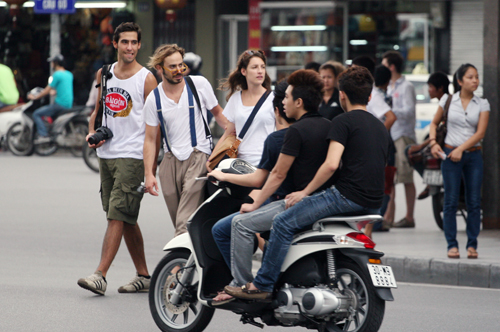As a tourist, you’re an obvious target for thieves (who may include your fellow travellers): carry your passport, travellers’ cheques and other valuables in a concealed money belt.
>>> Tips for visiting dalat vietnam
Vietnam is a relatively safe country for visitors, including women travelling alone. In fact, given the country’s recent history, many tourists, particularly Americans, are pleasantly surprised at the warm reception that foreign travellers receive. That said, petty crime is on the rise – though it’s still relatively small–scale and shouldn’t be a problem if you take common–sense precautions. Generally, the hassles you’ll encounter will be the milder sort of coping with pushy vendors and over–enthusiastic touts and beggars.

Petty crime
As a tourist, you’re an obvious target for thieves (who may include your fellow travellers): carry your passport, travellers’ cheques and other valuables in a concealed money belt. Don’t leave anything important lying about in your room: use a safe, if you have one. A cable lock, or padlock and chain, comes in handy for doors and windows in cheap hotels, and is useful for securing your pack on trains and buses. It’s not a bad idea to keep $100 or so separate from the rest of your cash, along with insurance policy details and photocopies of important documents, such as the relevant pages of your passport including your visa stamp.
At street level it’s best not to be ostentatious: forego eye-catching jewellery and flashy watches, try to be discreet when taking out your cash, and be particularly wary in crowds and on public transport. If your pack is on the top of the bus, make sure it’s attached securely (usually everything is tied down with ropes) and keep an eye on it during the most vulnerable times – before departure, at meal stops and on arrival at your destination. On trains, either cable-lock your pack or put it under the bottom bench-seat, out of public view. The odd instance has been reported of travellers being drugged and then robbed, so it’s best not to accept food or drink from anyone you don’t know and trust. Bear in mind that when walking or riding in a cyclo you are vulnerable to moped-borne snatch-thieves; don’t wear cameras or expensive sunglasses hanging round your neck and keep a firm grip on your bags. If you do become a target, however, it’s best to let go rather than risk being pulled into the traffic and suffering serious injury.

The place you are most likely to encounter street crime is in Ho Chi Minh City, which has a fairly bad reputation for bag-snatchers, pickpockets and con artists. Be wary of innocent-looking kids and grannies who may be acting as decoys for thieves – especially in the bar districts and other popular tourist hangouts. It’s best to avoid taking a cyclo at night, and you’d be unwise to walk alone at any time outside Districts One and Three.
Petty crime, much of it drug- and prostitution-related, is also a problem in Nha Trang, where you should watch your belongings at all times on the beach. Again, be wary of taking a cyclo after dark and women should avoid walking alone at night. Single males, on the other hand, are a particular target for “taxi girls”, many of whom also double as thieves.
It’s important not to get paranoid, however: crime levels in Vietnam travel are still a long way behind those of Western countries, and violent crime against tourists is extremely rare.
If you do have anything stolen, you’ll need to go to the nearest police station to make a report in order to claim on your insurance. Try to recruit an English-speaker to come along with you – someone at your hotel should be able to help.
See more: Tips for visiting Sa pa Vietnam in this winter
